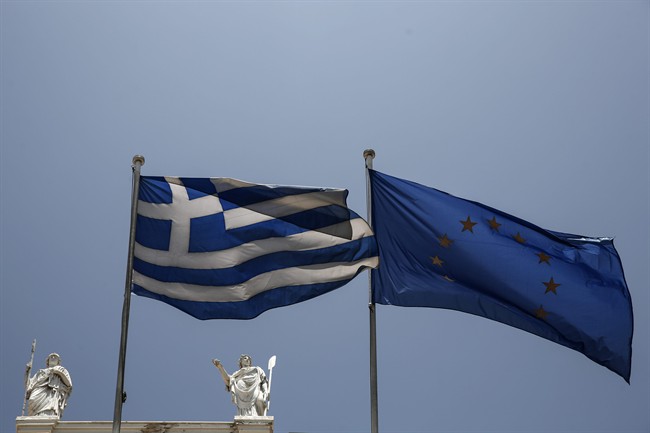ATHENS, Greece – The finance ministers of the eurozone have rejected a Greek request to extend the deadline of its bailout program until after a planned July 5 referendum.

However Greece’s finance minister says there is still a chance his country could reach a bailout deal with creditors, despite the latest breakdown in talks.
Eurozone finance ministers on Saturday rejected Greece’s request for an extension to its bailout program so that it could put the creditors’ bailout proposals to a popular vote July 5. Greece’s bailout program expires on Tuesday and it is unclear whether it can support its banks after that date without a deal with creditors.
Yanis Varoufakis says the eurozone finance ministers would continue their meeting without Greece on Saturday night to evaluate the consequences of the recent decisions.
He told reporters, however, that there is still the “possibility of negotiating through the day and through the night and through the day ahead of us in the coming days to improve the agreement.”
Anxiety over Greece’s future swelled on Saturday, with people queuing outside banks to withdraw cash, after Prime Minister Alexis Tsipras’ call to have the people vote on a proposed bailout deal increases the risks that the country might fall out of the euro.
The call for a vote radically raises the stakes in a standoff between Greece and its creditors over the terms for more financial support to the country. Greece’s bailout program expires on Tuesday, after which it is unclear whether its banks would be able to avoid collapse.
READ MORE: Why Greece is again in danger of default
About 50 people, most visibly anxious, were waiting early in the morning outside a Piraeus Bank branch in central Athens, one of very few that opens on Saturdays, before they found out it wouldn’t be opening after all. An elderly woman in the queue fainted.
Across Athens, people started flocking to cash machines shortly after Prime Minister Alexis Tsipras announced the referendum, just after 1 a.m. local time. The length of queues at cash machines, and the availability of cash, varies widely. The Bank of Greece assured, in a statement Saturday afternoon, that the flow of cash to ATMs will not be interrupted.

According to Parliament documents, the referendum will ask Greeks to vote on a proposal of reforms that the country’s creditors made on Thursday. The Greek government rejected it as imposing cuts that are too harsh on the general population.
The Greek government said it would recommend Greeks vote “no” in the referendum. What would happen in that case – whether Greece would have to leave the euro or try to renegotiate more time with creditors – is unclear.
Former prime minister Costas Karamanlis broke a longstanding silence and severely criticized the government’s “foolish choice.”
“The nation’s most vital interests demand that the country remains at the heart of Europe. The EU’s actual shortcomings do not, in any way, negate this…” Karamanlis said.
“Foolish choices that undermine this principle push the country to adventures, with unpredictable and possibly irreversible consequences,” he added.
Panagiotis Lafazanis, a senior Syriza minister overseeing the energy sector, environment and agriculture, came out strongly against approving the creditors’ proposal.
“A ‘No’ will provide a big respite for Greece and the Greek people,” he told reporters as he arrived at the Parliament. “It will be a big yes to a new era of reconstruction and progress.” Asked if this would take place inside or outside the euro, he said “It is you (the media) who pose this dilemma. The dilemma for the people is whether they will live better.”
Health Minister Panayiotis Kouroumblis, on the other hand, said that Greece does not want a rupture with Europe. “The referendum is part of the negotiation,” he said.
In the streets of Athens, views were mixed on the merits of holding a referendum.
“The people are not in a position to decide. Those who are in position to decide are the ones that know a bit more and they must explain and simplify the issues for the people,” said Grigoris Kanellopoulos, 41, a street seller of bagels.
Athina Kontosozou, 56, has already made up her made about how she will vote.
“No (to the creditors’ proposals), no to any more measures. We don’t know what will happen (after the referendum). Let’s hope that things will be better. And they will get better. We believe it”.
The AP’s Thanassis Stavrakis and Paris Ayiomamitis contributed to this report.



Comments